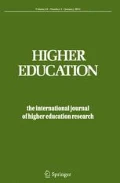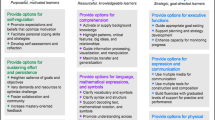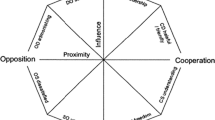Abstract
This paper reports on an empirical study which shows that qualitatively different approaches to teaching are associated with qualitatively different approaches to learning. More specifically, the results indicate that in the classes where teachers describe their approach to teaching as having a focus on what they do and on transmitting knowledge, students are more likely to report that they adopt a surface approach to the learning of that subject. Conversely, but less strongly, in the classes where students report adopting significantly deeper approaches to learning, teaching staff report adopting approaches to teaching that are more oriented towards students and to changing the students conceptions. The study made use of a teaching approach inventory derived from interviews with academic staff, and a modified approach to learning questionnaire. These conclusions are derived from a factor and cluster analysis of 48 classes (involving 46 science teachers and 3956 science students) in Australian universities. The results complete a chain of relations from teacher thinking to the outcomes of student learning. Previous studies have shown relations between teachers' conceptions of teaching and learning and their approaches to teaching. Numerous studies have shown correlations between students' deeper approaches to learning and higher quality learning outcomes. The results reported here link these two sets of studies. They also highlight the importance, in attempts to improve the quality of student learning, of discouraging teacher-focused transmission teaching and encouraging higher quality, conceptual change/student-focused approaches to teaching.
Similar content being viewed by others
References
Biggs, J.B. (1978). ‘Individual and group differences in study processes’, British Journal of Educational Psychology 48, 266-279.
Biggs, J. (1987). Study Process Questionnaire Manual. Melbourne: Australian Council for Educational Research.
Entwistle, N. and Ramsden, P. (1983). Understanding Student Learning. London: Croom Helm.
Gow, L. and Kember, D. (1993). ‘Conceptions of teaching and their relationship to student learning’, British Journal of Educational Psychology 63, 20-33.
Kember, D. and Gow, L. (1994). ‘Orientations to teaching and their effect on the quality of student learning’, Journal of Higher Education 65, 58-73.
Martin, E. and Ramsden, P. (1998). ‘Approaches to teaching creative writing’, in Dart, B. and Boulton-Lewis, G. (eds.), Teaching and Learning in Higher Education. Melbourne: Australian Council for Educational Research, pp. 26-41.
Marton, F. and Booth, S. (1997). Learning and Awareness. Lawrence Erlbaum: Mahwah, NJ.
Marton, F. and Säljö, R. (1976). ‘On qualitative differences in learning I. Outcome and process’, British Journal of Educational Psychology 46, 4-11.
Marton, F. and Säljö, R. (1997). ‘Approaches to learning’, in Marton, F. Hounsell, D. and Entwistle, N.J. (eds.), The Experience of Learning. Edinburgh: Scottish Academic Press, pp. 39-58.
Patrick, K. (1992). Teachers and Curriculum at Year 12: Constructing an Object of Study. Paper presented at the joint conference of the Australian Association for Research in Education and the New Zealand Association for Research in Education, Deakin University, Geelong, Australia (November).
Prosser, M. and Millar, R. (1989). ‘The how and what of learning physics’, The European Journal of Psychology of Education 4, 513-528.
Prosser, M. and Trigwell, K. (1997). ‘Relations between perceptions of the teaching environment and approaches to teaching’, British Journal of Educational Psychology 67, 25-35.
Prosser, M. and Trigwell, K. (1998). Understanding Learning and Teaching: The Experience in Higher Education. Milton Keynes: Open University Press.
Prosser, M., Trigwell, K. and Taylor, P. (1994) ‘A phenomenographic study of academics' conceptions of science learning and teaching’, Learning and Instruction 4, 217-231.
Ramsden, P. (1992). Learning to Teach in Higher Education. London: Routledge.
Ramsden, P., Margetson, D., Martin, E. and Clarke, S. (1995). Recognising and Rewarding Good Teaching in Australian Higher Education. Committee for the Advancement of University Teaching, Australian Government Publishing Service.
Tabachnick, B. and Fidell, L. (1989). UsingMultivariate Statistics. Northedge: Harper Collins.
Trigwell, K. (1995). ‘Increasing faculty understanding of teaching’, in Wright, W.A. (ed.), Successful Faculty Development Strategies. Boston, Anker Publishing Co, pp. 76-100.
Trigwell, K. and Prosser, M. (1991). ‘Relating learning approaches, perceptions of context and learning outcomes’, Higher Education (Special Edition on Student Learning) 22, 251-266.
Trigwell, K. and Prosser, M. (1996a). ‘Congruence between intention and strategy in science teachers' approach to teaching’, Higher Education 32, 77-87.
Trigwell, K. and Prosser, M. (1996b). ‘Changing approaches to teaching: A relational perspective’, Studies in Higher Education 21, 275-284.
Trigwell, K., Prosser, M. and Taylor, P. (1994). ‘Qualitative differences in approaches to teaching first year university science’, Higher Education 27, 75-84.
Van Rossum, E.J. and Schenk, S.M. (1984). ‘The relationship between learning conception, study strategy and learning outcome’, British Journal of Educational Psychology 54, 73-83.
Author information
Authors and Affiliations
Rights and permissions
About this article
Cite this article
Trigwell, K., Prosser, M. & Waterhouse, F. Relations between teachers' approaches to teaching and students' approaches to learning. Higher Education 37, 57–70 (1999). https://doi.org/10.1023/A:1003548313194
Issue Date:
DOI: https://doi.org/10.1023/A:1003548313194




